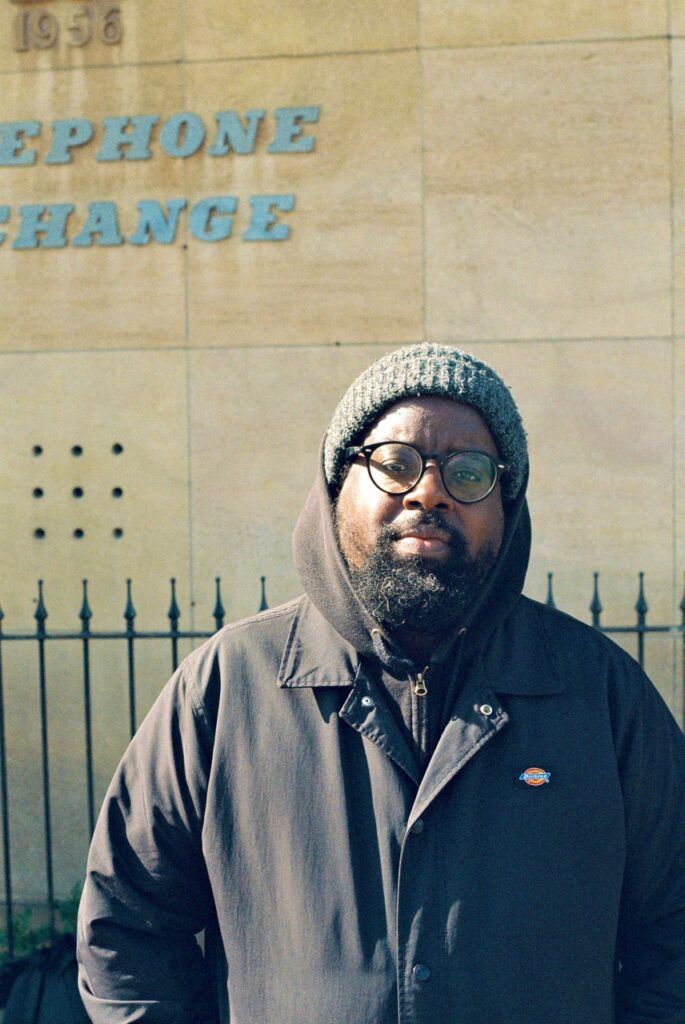The King of Misery: Daudi Matsiko’s stunning confessional
Written by Riles Moquin on January 5, 2024
It’s not often you hear a record that hits you like a brick yet floats with the gentleness of a feather. Daudi Matsiko’s The King of Misery is one of those records.
Singer-songwriter Daudi Matsiko releases The King of Misery on January 19th. The British-Ugandan has collaborated with Thundercat and received praise from music figures such as DJ Jamz Supernova and singer-songwriter Ghostpoet for the record’s lead singles, which included “Fool Me As Many Times as You Like” and “oMo (Man).”

From the moment you press play on the opening track of The King of Misery (“Guilty”), you are introduced to the delicate color of Daudi’s acoustic guitar. When the artist joins with his vocals, you feel a fragility behind his cracking voice as if the physical image of the track could shatter at any moment. It is this color that Daudi maintains throughout The King of Misery. Here and there the artist will pick up the tempo, such as on singles “Fool Me As Many Times As You Like” and “oMo (Man)” but in these moments he will not ever dare add the thump of a bass drum or the clatter of a snare to disturb the life of the track.
The ambience of The King of Misery creates a setting for Daudi’s heart-wrenching musings, lyrics that speak less of the artist’s life stories and more to the feelings he experiences. The result is a record of tracks that feel like a glass eternally falling towards a floor that is not there – forever stuck on its way towards shattering. The artist throws his eclectic sum of emotions onto the page, haunted by an acute self-awareness of his own shortcomings.
Guess I’m scared of broken pieces,
Scared of all the mess you’ll see.
-“Guilt”
Daudi’s titular guilt leads him towards self-hatred, an emotion ever-complicated by his self-awareness. He understands himself and the good in himself, but not enough to overcome his shame.
The singer yearns for human connection yet feels doomed to loneliness. “I don’t want to be alone,” he repeats on the chorus of “Falling.” By the end of The King of Misery, Daudi does not feel alone anymore and embraces the friendships in his life on “I Am Grateful For My Friends,” yet in a circular sense now feels guilt for a burdens he places on those in his life.
Not much fun these days I guess,
Humor well I used to have it,
I don’t laugh so easily, I wish I was less depressing.
-“I Am Grateful For My Friends”
Before we get to this point though, we must sit back and listen as Daudi endures The King of Misery in (mostly) solitude and loneliness. Oftentimes his guitar is his only friend, and when other collaborators appear, it feels less like they represent friends and more like added colors and textures within the singer’s lone mind. Album highlight “Fool Me As Many Times As You Like” pulls together beautiful woodwind textures atop the acoustic backbone, with chaotic saxophone riffs on the hook topping off one of the record’s best instrumentals.
The very next track, “Derby’s Dose,” adds a gentle female voice to accompany the artist on one of the record’s most solemn choruses. The track’s title and chorus reference Derby’s dose, a brutal and deplorable form of torture used on enslaved Black people in Jamaica during British colonial rule.
An unbound vine,
Fear made worse by time,
I’m gagging like Derby’s dose is mine.
-“Derby’s Dose”
“Derby’s Dose” is the most challenging listen on The King of Misery, a critical moment where the artist connects his own fears and guilt to the greater experience of the global Black diaspora.
On our way to the album’s conclusion we get the title track “King of Misery,” a number which contrasts gospel inspiration with words on never-ending depression and a “f*** off” refrain on the outro. The penultimate “Hymn” follows, a collaboration between Daudi and Danielle Frick. Rising synthesizers – a feature exclusive to this track – give way to a steady pulse and the only elaborated percussion on the record. The brightness suggests some type of epiphany, and we can’t help but breathe a bit after feeling the weight of the singer’s mind for the last half-hour. Yet the pulse gives out suddenly and we are left with some final words before we reach the already-discussed conclusion “I Am Grateful For My Friends.”
There’s no hope inside of me.
Am I too broken to relieve?
There isn’t any hope inside of me.
Lay your weary head on me,
I’ll break you off a bit of peace,
I’ll be air that you can breathe.
-“Hymn”
When we consume stories, we always hope they have a set beginning, middle, and end. We always hope the problem finds its resolution, and our hero reaches their nirvana. The truth is sometimes much more complicated.

We are introduced to Daudi on “Guilt” as a man who will not breathe for himself. We see our hero encounter more problems than we can count, and we hope he resolves each and every one. By the end of “I Am Grateful For My Friends,” we must realize the truth: our hero has only resolved one of these problems. Our hero no longer feels alone. Maybe that is progress, and maybe we could celebrate. But is it? Our hero will give a friend air to breathe, yet still will not breathe on his own. Daudi has taken a sideways step. Yet this is exactly what makes The King of Misery so important, in all its heart-wrenching beauty and painful fragility. The glass is still falling, and we are powerless to stop it. It leaves us feeling a little empty inside, as incomplete as the story we just heard.
Daudi Matsiko’s The King of Misery is set to be released on January 19th.





